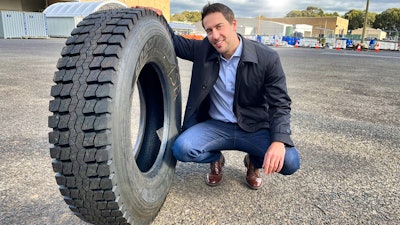
Rubber from used tires acts like sunscreen for roads and halves the rate of sun damage when mixed with bitumen, new research has found.
Engineers at RMIT University in Australia have discovered a bitumen blend that is both UV-resistant and withstands traffic loads, with the potential to save governments millions on road maintenance annually.
Unlike much outdoor infrastructure – such as playground equipment and outdoor furniture – roads are not designed with any sun protection, making them prone to cracking and potentially unsafe to drive on.
Incorporating recycled rubber not only offers sun protection but is a promising sustainable solution to the used-tire crisis in many countries, including Australia where an export ban on used tires has been in place since December 2020.
While research efforts have focused on improving the durability of roads in terms of traffic load, thermal aging and weather-related events, sun damage has received little attention – until now.
Sunscreen for roads
The new study led by RMIT’s Associate Professor Filippo Giustozzi provides a sustainable solution to UV protection for roads, with results published in the Journal of Cleaner Production.
“We found that the aging trend is actually slowed down when you add crumb rubber, which is recycled from scrap tires, into the top layer of a road,” Giustozzi said.
“This acts so effectively as a sunscreen for roads that it actually makes the surface last twice as long as regular bitumen.
“We knew that UV would be a factor in road degradation, but not by what degree or how to protect against it, as nobody has really been looking at this aspect.”
RMIT is one of the few universities in Australia to have a UV machine for asphalt studies, which can simulate weather-related aging and is usually used for testing outdoor furniture paints.
Giustozzi’s team used this machine to simulate the long-term effect of solar degradation in the lab on bitumen with different concentrations of crumb rubber: from a low concentration of 7.5% to a medium of 15% and a high of 22.5%.
After a month and a half of continuous exposure in the UV machine – equivalent to about a year of UV radiation in Melbourne, Australia – they measured the changes in bitumen’s chemical and mechanical properties.
Giustozzi said bitumen mixed with the high concentration of crumb rubber from recycled tires showed 50% less UV damage compared to regular bitumen.
While using more rubber was better in terms of UV resistance, Giustozzi said it was also important to balance this with mechanical performance.
“You don’t want something that is UV resistant but not truck resistant,” he said.
“We found adding between 18% and 22% of crumb rubber generates an ideal balance in terms of improving rut and fatigue resistance to traffic loads, while resisting UV aging.”
A sustainable solution to the used tire crisis
Tyre Stewardship Australia CEO, Lina Goodman, said while Australia produced around 450,000 tons of end-of-life tires in 2021, only around 70% of those were recycled or reprocessed.
Goodman said they were encouraged by the research in showcasing the viability and benefits of using crumb rubber from end-of-life tires, not only in roads and civil infrastructure, but across multiple sectors.
“We’re excited to collaborate on this project with industry and leading researchers at RMIT University," she said.
"A multi-organizational approach paves the way for new innovation and the opportunity to turn this resource into a value-added product.”
Giustozzi said an added advantage of crumb rubber was that it was already widely in use, including in some roads, but that the councils and state authorities using it were not aware of this ‘sunscreen’ effect revealed in the research.
“We hope this research will change that and open new opportunities.”
This research was supported by Tyre Stewardship Australia.






















